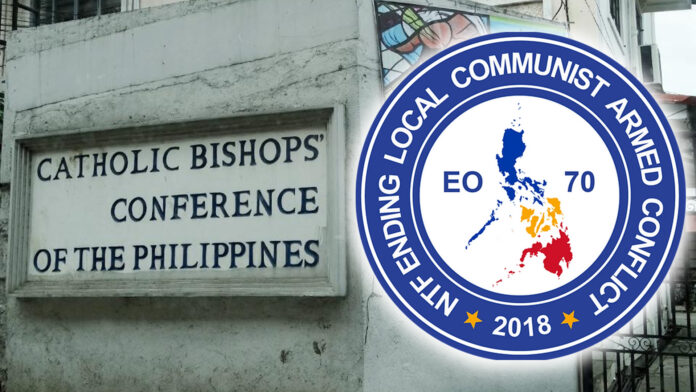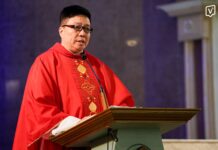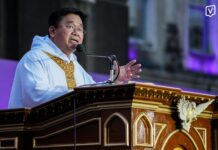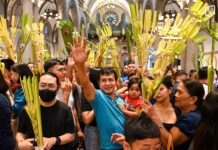THE CATHOLIC Bishops’ Conference of the Philippines (CBCP) clarified on Friday that one of its commissions, not the conference itself, had joined the National Task Force to End Local Communist Armed Conflict (NTF-Elcac).
The CBCP Episcopal Commission on Public Affairs accepted the invitation to be part of the executive committee of the government’s anti-insurgency task force to “address some Church issues vis-a-vis the government, including the issue about the red-tagging of some cause-oriented groups and Church organizations by the said body,” CBCP President Bishop Pablo Virgilio David said in a statement.
Following early criticism of the move on social media, the Caloocan bishop said only the commission would engage with other members of the NTF-Elcac.
“As such, this commission has access to the NTF-Elcac ExeCom (executive committee) and more opportunity to express the Church’s specific concerns since its mandate is to act as a liaison of the CBCP to the public and private sectors and to advance some of the social concerns and issues of the Church,” he explained.
David promised to raise the matter at the next meeting of the CBCP Permanent Council, in an apparent admission that the commission’s move did not have the prior knowledge or clearance of the CBCP’s main decision-making body.
“Can this commission engage the said government body in a dialogue without having to join its ExeCom as member – i.e. as private sector representative? We hope to come up with some resolutions on this matter soon,” the Caloocan bishop concluded.
Bishop Reynaldo Evangelista of Imus, Cavite serves as chairman of the commission, while EDSA Shrine Rector Fr. Jerome Secillano is executive secretary.
Undersecretary Ernesto Torres, NTF-Elcac executive director, announced on Thursday, Aug. 31, the inclusion of the CBCP as a representative of the religious sector.
CBCP said the commission was tapped because of its mandate to encourage parishes to engage in dialogue with barangay officials through its Ugnayan ng Barangay at Simbahan (UBAS) program.
Torres said the CBCP “warmly accepted” the task force’s invitation.
“[W]ith them on our side, it will be a lot easier to disseminate and cascade the information – the good news of the government to those living in the far-flung areas – considering the trust and confidence and respect that the general populace has for those in the religious sector,” Torres said. “It would readily be accepted by them.”
Other religious denominations will be invited in the future, Torres added.
NTF-Elcac has been notorious for red-tagging progressive groups and personalities, including clerics and church-linked organizations, alleging them to be in cohorts with communists to destabilize the government.
The task force’s former spokesperson, Lorraine Badoy, even accused a prelate, Bishop Gerardo Alminaza of San Carlos, Negros Occidental, of being a mouthpiece of the Communist Party of the Philippines and New People’s Army for merely appealing to resume peace talks. The prelate described the statement as “demonic and diabolical.”
NTF-Elcac was established in 2018 via Executive Order No. 70, signed by former president Rodrigo Duterte, to “provide an efficient mechanism and structure for the implementation of the whole-of-nation approach to aid in the realization of the collective aspiration of the Filipino people to attain inclusive and sustainable peace.”
Under the executive order, private sector representatives are subject to the approval of the president and will serve a one-year term. Jenna Mariel A. Gonzales














